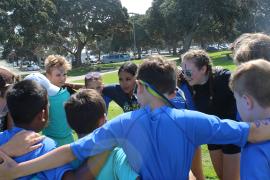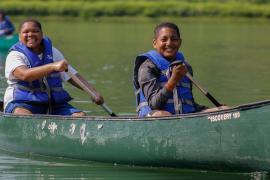Most parents want their children to develop traits like honesty, responsibility, kindness, empathy, respect, perseverance, self-confidence, curiosity, creativity, and compassion; essentially aiming to raise kids who are ethical, reliable, caring, and capable of navigating challenges with positive attitudes.
That is an AI’s response to the question, “What character traits do parents most want their kids to develop?”
According to a recent Character at Camp survey, “Almost 90 percent of respondents said their camp trains staff to promote specific skills or traits, and a similar number of respondents said their camps design programs around specific character skills or traits” (American Camp Association, 2024).
It’s clear that many camp professionals understand the powerful role our camp programs play in helping youth develop prosocial character traits. We’re actively training our staff to promote specific traits, but how well are we communicating to parents the character work we’re doing with their kids? Being more intentional about the way we communicate and educate our campers’ parents about the character traits we’re focusing on developing at our individual camps is an important way we can, together, help put camps at the center of the character-development conversation.
Perhaps without knowing it, you’ve already been communicating with parents about character development at your camp. Any time you share a testimonial from a camper, staff member, or parent about the transformational change they or their child experienced at camp, you’re educating your community about the positive impact camp experiences provide.
But how can we be more intentional and proactive about communicating to our camper parents the crucial benefits camp offers with regard to character growth? And how can we keep the character work we’re doing top of mind among parents when they think of camp?
Strategies for Communicating Your Camp’s Character Growth Initiatives to Your Campers’ Parents
The following ideas encompass some simple and effective means of communicating with parents about the character growth campers experience at your camp:
Share Something Created by Someone Else
You don’t need to write a book or produce a podcast in order to educate parents about the character growth that you’re focusing on at camp. Simply sharing an article, podcast episode, or TED Talk about a specific character trait is an excellent way to engage with parents and communicate your camp’s focus on promoting a particular attribute.
Repurpose Your Staff Training
You put a lot of work into training your staff. Why not repackage some of your character-related staff training sessions to share with parents? This can take the form of a brief video excerpt from the training or a write-up of key practices you follow. If you have any posters or materials you use at camp to communicate about character, consider sharing those resources with parents as well.
Host a Parent Educational Event
During the off-season, many camps already host live or virtual parent events focused on marketing camp to new families or on helping parents prepare for the summer. If you’re already offering these types of parent events, consider adding an educational component to what you’re currently doing by sharing a book recommendation or letting parents know about a character focus you have for the summer.
Alternatively, you can host an event that’s focused on a specific character-related topic. You can host a book club discussion or a follow-up discussion about an article, podcast episode, or TED Talk you previously shared.
Have a Summer Theme
At my camp, we decided to start enhancing our goals for camper growth by adding a specific theme and focus for each summer. Our summer themes have ranged from “Gratitude” to “Give a Hand” (helping others) to “Find a Friend” (making friends). The themes have given us a reason to share resources and ideas with our staff, campers, and parents. We do a blog post describing the theme and share the resources and activities we’ll be using to promote the topic. We put a big banner with our theme’s logo over our amphitheater stage, so we are reminded daily of our focus. And we develop specific activities related to the theme that we roll out throughout the summer. The theme gives us many opportunities to share with parents what we’re doing and what we’re teaching campers regarding character traits and social-emotional skills.
Participate in an Event or Initiative
If developing a whole theme for the summer seems too daunting, consider participating in initiatives like Camp Kindness Day (ACAcamps.org/campkindnessday), which can provide you with resources and activity ideas. Let your parents know you’re participating, and share photos and videos from the event.
Many organizations offer free resources and information for promoting character-based initiatives.
- The Greater Good Science Center has activities and resources related to numerous character traits, including gratitude (greatergood.berkeley.edu/topic/gratitude). You can use the activities at camp and share with parents about the activities as a way to promote their continuing the practice of being grateful at home.
- Let Grow (letgrow.org) has resources for families and schools (which can be adapted to camp) for promoting independence in kids.
- Pass It On (passiton.com) has some excellent stories, posters, and ideas for promoting character topics such as persistence, sportsmanship, and sacrifice. They also have feel-good quotes and posters that you can share with your community.
Think about what character trait you most want to focus on at your program, and research organizations that provide activities and resources related to that trait. You can share the resources with your camp families both during the summer and throughout the year. If you’re wanting to remind parents of your character focus during the off-season, you can share links to events — like World Kindness Day (randomactsofkindness.org/world-kindness-day) — that happen outside of the summer months.
Film and Share Character-based Testimonial Videos
Many camps film short videos of campers and staff testimonial interviews because they are effective marketing tools. This summer, consider filming campers and staff sharing what they’ve learned about a specific character trait you focus on at your camp. For example, if your camp focuses on promoting good stewardship of the environment, you could prompt campers being interviewed with, “Share what you’ve learned at camp about taking good care of our environment.”
If you’re promoting the character trait of responsibility, you could prompt them with, “Share what you’ve learned about being a responsible member of your community.”
Last summer, our theme was “Building Empathy,” and we asked campers to share what they learned about empathy and being more empathetic.
These short videos can be used individually or combined into longer video reels with titles like, “What We Learned About Responsibility at Camp XYZ This Summer.” These types of videos are an amazing way to communicate to your parents what is actually happening regarding character growth at your camp.
Interactive Social Media / News Posts
You can gather input from your community via surveys or community-engagement questions on social media. You can ask general questions like, “How has camp made you a better person?” Or you can get more specific with questions like, “What did you learn at camp about being a good friend?”
Figure Out What Character Traits You’re Actually Teaching Campers
Peruse other camps’ websites, and you’ll find that many camps focus on character growth. If you want to dive deeper and learn what character growth your campers, staff, and parents see happening at your camp, consider doing some internal research via surveys or feedback analysis. One interesting exercise is to ask your campers, staff, and parents open-ended questions and see what character traits they mention most. I like to ask, “How has your time at Camp XYZ changed you as a person?”
When you ask, a few specific character traits will likely rise to the top as the qualities you are most promoting and best teaching. Lean into those traits by putting more focus on one or two skills. Spend a few years keeping those traits in the forefront of your communication with parents, staff, and campers.
The more you intentionally focus and share character-related topics and resources, the more parents will come to see you — and your camp — as experts on the topic of character growth.
Photos courtesy of The Park Slope Day Camp, Brooklyn, NY; Camp Oty'Okwa, South Bloomingville, OH; Green River Preserve, Cedar Mountain, NC.
References
American Camp Association. (2024, March 18). How camps include character. ACA. ACAcamps.org/blog/how-camps-include-character
Monke, A. (2019, August 30). Resource Roundup for Camp Professionals. Camping Magazine. ACAcamps.org/article/camping-magazine/resource-roundup-camp-professionals
Audrey Monke, with her husband Steve, has owned and directed Gold Arrow Camp (Lakeshore, California) since 1989. On her website and podcast, Sunshine Parenting (sunshine-parenting.com), Audrey shares ideas, stories, and resources for parents and youth development professionals. Audrey’s book, Happy Campers: 9 Summer Camp Secrets for Raising Kids Who Become Thriving Adults (Hachette-Center Street, 2019) shares strategies for bringing the “magic” of camp home.


